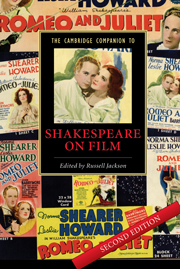Book contents
- Frontmatter
- Introduction: Shakespeare, films and the marketplace
- Part I Adaptation and its Contexts
- Part II Genres and Plays
- Part III Directors
- 9 The Shakespeare films of Laurence Olivier
- 10 Orson Welles and filmed Shakespeare
- 11 Grigori Kozintsev’s Hamlet and King Lear
- 12 Franco Zeffirelli and Shakespeare
- 13 Flamboyant realist: Kenneth Branagh
- Part IV Critical Issues
- Further Reading
- Filmography
- Index
- Series List
11 - Grigori Kozintsev’s Hamlet and King Lear
from Part III - Directors
Published online by Cambridge University Press: 28 July 2007
- Frontmatter
- Introduction: Shakespeare, films and the marketplace
- Part I Adaptation and its Contexts
- Part II Genres and Plays
- Part III Directors
- 9 The Shakespeare films of Laurence Olivier
- 10 Orson Welles and filmed Shakespeare
- 11 Grigori Kozintsev’s Hamlet and King Lear
- 12 Franco Zeffirelli and Shakespeare
- 13 Flamboyant realist: Kenneth Branagh
- Part IV Critical Issues
- Further Reading
- Filmography
- Index
- Series List
Summary
More than two centuries ago Voltaire made a telling remark: 'All the arts are brothers, each one is a light to the other.' The career of Grigori Kozintsev (1905-73) as an interpreter of Shakespeare in Russian theatre, cinema and literary criticism is a striking illustration of this maxim. Kozintsev’s road to his two Shakespeare films was long and not very easy. It passed through three channels, the first of which was the theatre - the director’s earliest passion. As early as 1923 the young Kozintsev was planning to perform Hamlet as a pantomime in the 'Factory of the Eccentric Actor' (FEKS), the experimental group he created with Leonid Trauberg and Sergei Yutkevich, but this plan was not realised. Seventeen years later, already a well known film director, he returned to Shakespeare on stage. In 1940 he wanted to perform Henry IV at one of the Leningrad theatres, but this, too, did not take place. It was a year later, in 1941, that Kozintsev achieved his first Shakespearean production, King Lear, at the Bolshoi Dramaticheski Teatr in Leningrad. His next step was a production of Othello at the Pushkin Theatre: the play was performed during 1943-4 in Novosibirsk, where the Leningrad company had been evacuated during the war. In 1949 Kozintsev was offered the chance to stage King Lear at the famous Kamerny Teatr in Moscow, run by Alexandr Tairov, but this proposal coincided with the gloomy period of recurrent witchhunts in the USSR, and the Kamerny, with its innovative aesthetics, was de jure renamed but de facto closed down by the authorities. The most important event in the history of Kozintsev’s interpretations of Shakespeare was his Hamlet at the Pushkin Theatre in 1954. The performance was one of the two first productions of the play on the Soviet stage in the post-Stalin years.
- Type
- Chapter
- Information
- The Cambridge Companion to Shakespeare on Film , pp. 203 - 215Publisher: Cambridge University PressPrint publication year: 2007

